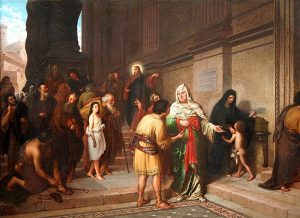Thoughts on Sunday’s Lessons for Nov. 10, 2024 (Pentecost 25B/Proper 27)

The widow’s mite (1876), oil painting on canvas by João Zeferino da Costa (1840-1915). Museu Nacional de Belas Artes, Rio de Janeiro, Brazil. (Click image to enlarge.)
First Reading (Track One): Ruth 3:1-5; 4:13-17
Ruth, a recently widowed young Moabite woman, has settled in Bethlehem with her Israelite mother-in-law, Naomi, who is also a widow. In the tough world that widows and orphans faced in those times, one of them needs to find a husband to save the family from poverty. Through a bit of trickery suggested by Naomi, Ruth persuades her kinsman Moab to marry her. It works, and the couple has a child named Obed. Why is this little story placed in context with the books about Israel’s evolution as a nation that bracket it in the Hebrew Bible? The final verses of this reading reveal the answer: The child Obed will become the grandfather of King David, placing Ruth and Moab in the ancestral line of Israel’s Messiah.
First Reading (Track Two): 1 Kings 17:8-16
Both tracks of Sunday’s first readings introduce us to tough widows who do what needs to be done; and they foreshadow another generous widow in Mark’s Gospel. In this Track Two first reading, God commands the prophet Elijah to go to a poor widow – a foreigner, not an Israelite – who will feed him. When Elijah arrives, the widow is, quite reasonably, reluctant. She has nothing but crumbs, she says. The region is suffering a famine, and she and her son are near death from hunger. But they all trust in God, and a miracle ensues: She follows Elijah’s instructions, makes cakes from the paltry provisions, and her tiny supply of oil and meal feed everyone and last until the drought ends.
Psalm (Track One): Psalm 127
Resonating with the themes In the passage from Ruth, Psalm 127 celebrates the importance of maintaining home and family. In the ancient Near East, it was difficult for a family to survive without strong sons to build the home, grow crops, and protect the family from invaders. Sons like these are gifts that can come only as a blessing from God, the Psalmist sings. God builds the house, watches over the city like a watchman keeping vigil, and provides children as a gift to God’s people: a quiver full of God-given arrows to help protect against enemies.
Psalm (Track Two): Psalm 146
Psalm 146 begins as a hymn of praise to God, but it soon turns to earthly matters: God can be trusted, but earthly rulers cannot. “Put not your trust in rulers, nor in any child of earth, the Psalmist warns, “for there is no help in them.” We should place our hope in God, our creator, instead, who gives hope to widows and orphans; help for the poor, justice for the oppressed, freedom for the prisoner, and help for those who are disabled, alone, strangers in strange lands. God shall reign forever, through all generations.
Second Reading: Hebrews 9:24-28
The Letter to the Hebrews continues its extended discourse contrasting Jesus favorably as the great High Priest, against the writer’s view of the deficiencies of the Jerusalem Temple’s earthly high priests. The Temple, in this account, is merely a copy of God’s domain, and its high priests found it necessary to sacrifice animals on the people’s behalf repeatedly, year after year, in a ritual that does not last. But, it continues, Jesus sacrificed himself once for all. When Jesus returns, there’ll be no need for further sacrifice to deal with sin – that work has already been done. Jesus will come to save his faithful people who eagerly wait for him.
Gospel: Mark 12:38-44
Jesus has arrived in Jerusalem on his final journey, and he is challenging the religious and political establishment in ways that will turn them angrily against him. First he scorns the scribes for their arrogance and hypocrisy. He mocks them for flaunting their wealth and power with ostentatious dress and prayer while they “devour widows’ houses.” Then, as Jesus sits near the Temple treasury, watching believers make their donations, a poor widow appears. She has little, but in contrast with the scribes, she gives two small coins: all that she has. Jesus praises her, not for giving all that she had, but because she gave it from her heart. It was not the quantity but the quality of her giving that mattered.
